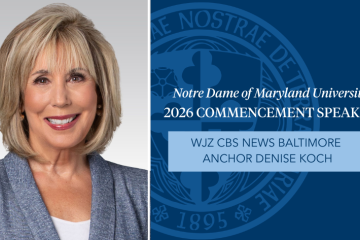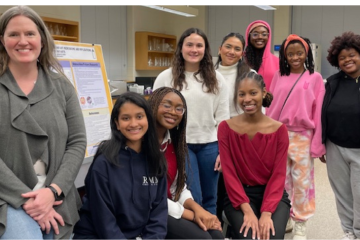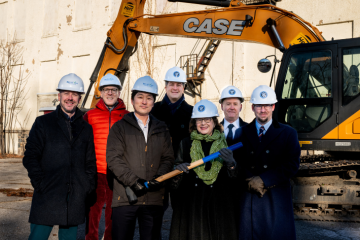Class of 2024 Spotlight: Abdurrahmon Talabi
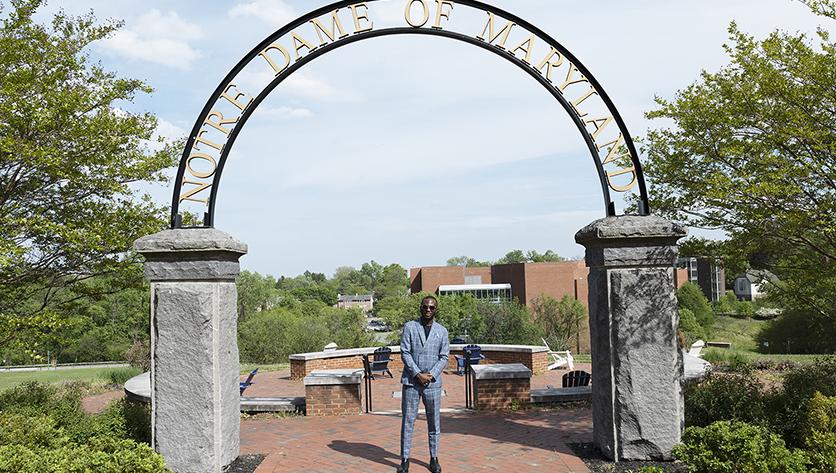
By: Erik Pedersen, Content Strategy Director
Class of 2024 Spotlights
BALTIMORE – Abdurrahmon Talabi decided to become a pharmacist during the height of the COVID pandemic. Originally from the West African country of Nigeria, Talabi had moved to New York in 2019 to begin a Ph.D. program in sustainability, but he changed course to pursue a career where he could more directly impact people in need of care.
Talabi dealt with a variety of challenges during his four years as a student in Notre Dame of Maryland University’s School of Pharmacy, including multiple hospitalizations caused by Hemoglobin SC disease (HgbSC), a form of sickle cell disease. Through strong relationships built with both his professors and fellow students, he was able to overcome those obstacles and match for a first-year residency at the prestigious Children’s Hospital of Philadelphia (CHOP) after graduating from Notre Dame this month.
Learn more about Abdurrahmon’s path to Notre Dame and his pharmacy school experiences:
What was your educational background prior to entering pharmacy school, and what was it that led you to America?
I grew up in Nigeria, and I earned a bachelor’s degree there in pharmacology in the College of Medicine at the University of Lagos, which is one of the premier universities back home, while finishing in the top five percent of my class. I stayed at the University of Lagos to obtain a master’s degree in environmental toxicology and pollution management. I then moved to Germany for a master’s program/Ph.D. in environmental management, and I moved to New York in 2019 after receiving a fully funded scholarship for a Ph.D. program at Rochester Institute of Technology in sustainability.
What led you to change course and pursue a career in pharmacy?
I left my program at RIT during the COVID pandemic. I felt like I needed to be doing more – I wanted to pursue something where I could work directly with people in need. I started applying to pharmacy schools, and NDMU came through for me. I had an offer from another school at the time when I came for my interview at NDMU, but (Dr. Matthew Shimoda, Dean of the School of Pharmacy) sold me on the small class sizes, the close relationships between students and faculty, and the support system offered here. I was also offered a great scholarship. Deciding to come to NDMU was the best move I’ve made.
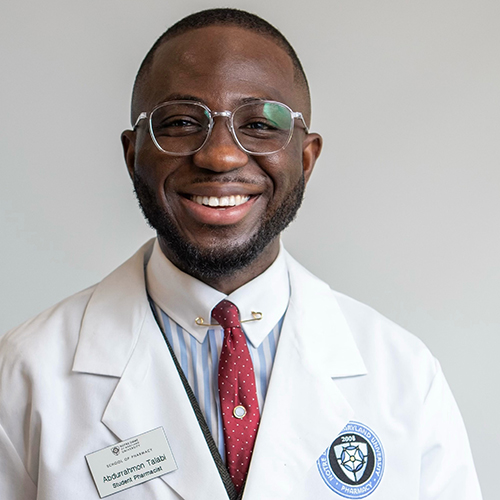
What was your relationship like with the professors here?
I don’t know where to begin without getting emotional. I’ve been able to build strong relationships with so many faculty members here. They know you – you’re not just a number passing through. They are like family to me. I was always comfortable reaching out to them for advice and mentorship.
I’m an international student, and during my first year there was an issue with transferring my documentation from my previous school. NDMU was able to rally around me and make sure that I was protected from immigration issues. They helped me sort things out with the immigration office. They made sure that I was able to complete my education, and that’s something that I’m forever grateful for.
My professors were very accommodating, and they always reach out to students to make sure that we have all the resources and guidance that we need to be successful. It was essential for me to know that I have people that I can rely on who have my support any time I need it, especially in a country where I don’t have many family ties.
What are some obstacles that you’ve dealt with, and what kind of support did you receive here to help you overcome those obstacles?
I’m very grateful for the support I received from staff, faculty and the student community. I encountered lots of challenges at NDMU, including immigration concerns, family issues, financial difficulties, and especially health issues. As a recessive carrier of the sickle cell gene trait HgbSC, I experienced frequent sickle cell crises, sometimes with serious hospitalizations. Navigating these health challenges with no family members close by made it even more difficult.
However, I was able to lean on support from the NDMU School of Pharmacy community. Dr. Shimoda was instrumental in getting me through these challenges. He offered me fatherly advice, guided me, and was very helpful in offering support whenever needed. In addition, the faculty, especially Dr. Jennifer Bailey, Prof. Sherry Moore, Dr. Jane Ho and Drs. James and Nicole Culhane were very helpful in providing me with additional support and accommodations.
The NDMU counseling office provided valuable counseling as well, which was helpful to get through tough days. I am profoundly thankful for the friendship and support from a host of pharmacy students, many of whom have now become like family. The list is long, but I would not have gotten through pharmacy school without their help and support.
Were you involved with any student organizations during your time on campus? If so, what roles did you hold and how did they help you grow both as a leader and a pharmacist?
I didn’t get involved until my second year. I wanted to make sure that I was joining for the right reasons, not just because everyone else was doing it. The Student National Pharmaceutical Association (SNPhA) was the first organization that appealed to me. I was elected for the position of Immunization Chair.
The organization speaks to the true nature of why I wanted to be a pharmacist and what kind of pharmacist I wanted to be in the future. SNPhA embodies the ideals of community service, especially bridging the health inequality gap among underserved communities. Having grown up in a developing country with poor access to healthcare, and considering my health condition, I can really relate to that.
I was able to do a lot of educating, especially on bringing awareness to immunizations for kids, adults, and the general public. Working closely with SNPhA helped me see what problems exist in terms of healthcare access, and learn ways to address those problems. That also contributed to my leadership experience, and moving forward I plan to participate at the national level, using my platform to speak truth to power and help make changes wherever I can.
I also became a member of NDMU’s American Pharmacists Association Academy of Student Pharmacists chapter and the Student Society of Health System Pharmacists once I realized that I wanted to do a residency. They provided an avenue to discuss issues with leaders in the health system. As an active member, I contributed to the growth of the organizations by helping the executive members implement their plans.
What was your reaction when you found out you had been selected for a residency at the Children’s Hospital of Philadelphia?
I was lucky enough to interview with some of the top pediatric children’s pharmacy residencies in the country. I remember my mentor recommending the program at the Children’s Hospital of Philadelphia as one of the top ranked training centers. It felt like a longshot, but after an exhaustive interview process, I knew instantly that I was going to rank them as my number one program. That ranking decision came so easy because of the feedback from current residents who spoke highly about the program, and the honest answers provided during interviews with the residency program director. Matching to the program felt very organic and a dream come true.
I’ll have a chance to do rotations all over the hospital. My plan in the future is to specialize in pediatric oncology, so I will probably do two oncology rotations – one required and another, an elective. As a very big institution with teaching, academic and research collaboration with the Perelman School of Medicine at UPenn, I will be challenged and have exposure to a range of different acuity cases. I couldn’t be prouder and happy to match with them.
Do you have any message you’d like to share with pharmacy students who are still working their way through the program?
Pharmacy school is a marathon – it’s important to pace yourself. Take things one step at a time, and don’t hesitate to reach out if you need help. If you have any challenge, whether it be personal or academic, people are always here to assist you at NDMU. Dr. Shimoda and the rest of the faculty are all approachable and willing to help, and you can reach out to the Counseling Center if you need to take care of your mental health. NDMU has countless resources available to get students through their challenges. Don’t be afraid to use them.
Established in 1895, Notre Dame of Maryland University (NDMU) is a private, Catholic institution in Baltimore, Maryland, with the mission to educate leaders to transform the world. Notre Dame has been named one of the best "Regional Universities North" by U.S. News & World Report.


